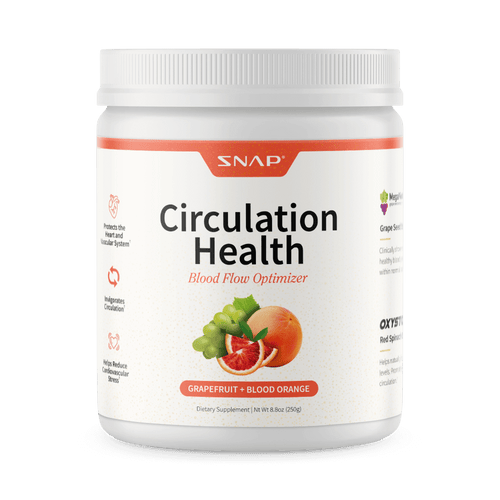Juicing is a popular way to support kidney health by providing essential nutrients that can help your body function more efficiently. When you include fruits and vegetables rich in antioxidants, your kidneys may benefit from the detoxifying and restorative properties these natural ingredients offer. Drinking juices that incorporate ingredients like beets, parsley, and cucumber can promote better urinary tract health and overall hydration.
By focusing on high-quality superfoods and botanicals, you can work towards optimizing your health in a natural and effective way. Juicing, when combined with a balanced diet, can be a simple approach to maintain kidney wellness.
Engaging in juicing is not just about drinking a tasty beverage; it's about embracing a healthier lifestyle. With options that support the caregiving role of kidneys, juicing can be an excellent part of your daily routine.
$57.00

Santé rénale
Understanding Kidney Health
Kidneys are vital organs that filter waste and excess fluids from your blood. Each kidney is about the size of a fist and plays a critical role in maintaining overall health by balancing electrolytes and releasing hormones.
Key Functions of the Kidneys:
-
Filtration: Removes toxins and waste products from the bloodstream.
-
Regulation: Balances fluids, electrolytes, and pH levels.
-
Hormone Release: Produces hormones that support healthy blood pressure and strengthen bones.
Signs of Healthy Kidneys:
-
Clear Urination Patterns: Regular frequency and color.
-
No Swelling: Absence of swelling in ankles or feet.
-
Steady Blood Pressure: Normal range without significant fluctuations.
Maintaining kidney health is crucial. Eating a balanced diet, staying hydrated, and monitoring blood pressure are simple ways to support your kidneys. Juicing with kidney-friendly ingredients like cranberries and cucumber can be an effective way to provide nutrients.
Tips for Enhancing Kidney Function:
-
Stay Hydrated: Drink enough water daily.
-
Eat Kidney-Friendly Foods: Focus on fruits, vegetables, and whole grains.
-
Limit Salt Intake: Reducing salt helps support healthy blood pressure.
We created products like our Kidney Health formula, which is rich in antioxidants and botanicals designed to support your kidneys. This blend helps promote detoxification and healthy kidney function, making it a beneficial addition to your wellness routine.
Your kidneys work tirelessly to keep your body in balance, so it’s important to give them the care and attention they deserve. Making small changes to your lifestyle can have a big impact on maintaining kidney health.
$29.00

Détox
$34.00
Basics of Juicing
Juicing is a great way to consume fruits and vegetables. It involves extracting juice from fresh produce. This process keeps the nutrients while discarding the fibrous parts. You get a drink rich in vitamins, minerals, and antioxidants.
Benefits of Juicing:
-
Nutrient Boost: Juicing can help you quickly absorb nutrients.
-
Hydration: Provides a source of hydration through fruits and veggies.
-
Variety: Allows you to try different produce easily.
Basic Steps:
-
Choose Ingredients: Use fresh fruits and vegetables.
-
Wash Thoroughly: Clean to remove dirt and pesticides.
-
Cut Into Pieces: Makes juicing easier and faster.
-
Juice: Use a juicer or blender to extract the juice.
-
Serve and Enjoy: Drink immediately for the best taste and nutrient retention.
Common Juicing Ingredients:
-
Fruits: Apples, oranges, lemons
-
Vegetables: Spinach, kale, cucumbers
-
Add-ins: Ginger, turmeric for extra flavor
Beneficial Nutrients for Kidneys
Juicing can provide vital nutrients to support your kidneys. These nutrients help with detoxification, improve function, and protect against damage.
Antioxidants and Their Role
Antioxidants play a key role in protecting your kidneys from oxidative stress. This stress can damage cells and lead to health issues. Juices rich in antioxidants like vitamin C and polyphenols can help protect these organs. Ingredients like berries, kale, and spinach are packed with these powerful compounds.
Including antioxidant-rich fruits and vegetables in your juices aids in reducing inflammation and protecting your kidneys. When antioxidants neutralize free radicals, they prevent damage and help maintain healthy kidney tissue.
Consider adding ingredients known for their antioxidant properties to your juicing routine.
Essential Vitamins for Kidney Function
Vitamins are essential for proper kidney function. Vitamin B12 supports the production of red blood cells, which is crucial for overall health. Vitamin D helps regulate calcium, promoting healthy bones and reducing the risk of kidney disease.
Juicing ingredients like carrots, oranges, and kale can supply these essential vitamins. A focus on these vitamins helps ensure your kidneys can perform their vital functions efficiently. Incorporating a range of fruits and vegetables in your juice provides a comprehensive nutrient profile.
Minerals to Support Kidney Health
Certain minerals are vital for kidney health. Potassium and magnesium help support healthy blood pressure and support fluid balance. Calcium plays a crucial role in bone health and regulating kidney function.
Incorporating leafy greens and citrus fruits into your juicing routine can boost your intake of these minerals. Pay attention to potassium levels if you have kidney issues, as excess could be harmful.
Best Fruits and Vegetables for Kidney Health
For optimal kidney health, focus on consuming fruits and vegetables that support your body's detoxification processes, aid in reducing inflammation, and are rich in antioxidants. Below are some of the most beneficial options to include in your diet.
Dark, Leafy Greens
Dark, leafy greens such as spinach, kale, and Swiss chard are packed with essential nutrients. They are high in vitamins A and K, which can help support kidney function and boost overall health. These greens are also rich in antioxidants that combat oxidative stress, which is crucial for maintaining kidney health.
Including these in your diet can also promote healthy blood pressure levels, benefiting your kidneys. You can easily incorporate them into salads or smoothies.
Berries
Berries like blueberries, strawberries, and cranberries are excellent for kidney health. They are low in potassium and high in antioxidants. Blueberries, in particular, contain nutrients that can help protect the kidneys from damage. Cranberries can support urinary tract health, reducing the risk of infections.
These fruits are also known for their anti-inflammatory properties. They can be enjoyed fresh or added to desserts, cereals, or as a topping for yogurt. Eating berries regularly can significantly contribute to your kidney health.
$46.00

Santé de la circulation
$57.00
Citrus Fruits
Citrus fruits such as oranges, lemons, and limes are beneficial for kidneys because of their high vitamin C content. This vitamin is crucial for reducing inflammation and improving immune function. Lemon juice, in particular, can help prevent kidney stones by increasing citrate levels in the urine.
These fruits are versatile and can be consumed as whole fruits, juices, or flavored waters. Including them in your daily routine can offer protective benefits for your kidneys. Incorporating these fruits and vegetables into your diet can promote kidney health and overall well-being. It's important to maintain a balanced diet to ensure your kidneys function effectively.
Recipes for Kidney-Friendly Juices
Creating juices with ingredients rich in nutrients can be beneficial for kidney health. Key recipes include green juices loaded with cleansing vegetables, antioxidant-rich berry blends, and refreshing citrus infusions. These recipes focus on selecting ingredients that support kidney function while providing a delicious boost to your daily routine.
Cleansing Green Juice
Boost your kidney health with a cleansing green juice. Use ingredients like cucumber, celery, and spinach, as they contain high water content and essential nutrients. Kale can also be included due to its rich supply of vitamins A, C, and K.
To make this juice, blend:
-
1 cucumber
-
2 stalks of celery
-
A handful of spinach
-
A handful of kale
-
Half a lemon for a touch of citrus
This combination provides hydration benefits and promotes detoxification. Adding a small apple can enhance the flavor without overwhelming sugar content. Enjoy this refreshing mix as a part of your morning routine or anytime you need a revitalizing boost.
$53.00

Collagène et légumes verts
$61.00
Antioxidant Berry Blend
For an antioxidant boost, try a berry blend. Berries like blueberries, strawberries, and raspberries offer ample antioxidants without excessive potassium. These properties are crucial for supporting kidney function as they help help soothe inflammatory symptoms.
Combine:
-
Half a cup of blueberries
-
Half a cup of strawberries
-
Half a cup of raspberries
Optionally, add a handful of spinach for extra nutrients and a splash of coconut water for hydration and taste. This blend offers a tasty way to consume antioxidants.
Refreshing Citrus Infusion
Citrus fruits are known for vitamin C and their hydrating properties. For a citrus infusion, use oranges, lemons, and limes. These fruits can help flush out toxins and boost overall health.
Blend together:
-
2 oranges, peeled
-
Half a lemon
-
Half a lime
To enhance taste and benefits, you may include a slice of ginger. This combination adds a touch of spice along with anti-inflammatory properties. Enjoy this refreshing drink during the day to keep you hydrated and invigorated.
Juicing Tips and Techniques
Juicing for kidney health requires careful planning and attention to detail. Choosing the right equipment and properly preparing ingredients are essential steps to ensure you get the most out of your juicing routine.
Choosing the Right Juicer
Selecting the best juicer depends on your needs and budget. Masticating juicers are great for leafy greens and softer fruits because they produce more juice and retain nutrients better. Centrifugal juicers are faster and generally more affordable, but they may not extract as much juice from greens. Look for a juicer that is easy to clean to encourage regular use.
Preparation and Storage
Properly preparing your fruits and vegetables is crucial. Wash all produce thoroughly. Peel any fruits with thick skins to prevent bitterness. Cutting ingredients into smaller pieces can help the juicer work more efficiently.
It's important to consume your juice immediately after preparation to preserve nutrients. If you must store it, use an airtight container in the fridge and consume it within 24 hours to minimize nutrient loss. Consider using storage containers made from BPA-free materials for added safety. Always practice safe handling to get the best health benefits from your juice.
Potential Risks and Considerations
When juicing for kidney health, it is important to consider how certain components in fruits and vegetables may impact your body. Sugar content, oxalate levels, and potential interactions with medications need careful consideration to maintain balanced health.
Sugar Content in Fruits
Juicing fruits can lead to high sugar intake because, unlike whole fruits, juice lacks fiber which helps moderate sugar absorption. High sugar levels can stress your kidneys, particularly if you have a condition like diabetes. This can affect insulin levels and increase the risk of kidney damage.
Consider using low-sugar fruits such as berries and apples. Regular monitoring of your blood sugar levels can help manage these risks.
Oxalate Levels in Vegetables
Many vegetables contain oxalates, which can accumulate and form kidney stones in some individuals. Spinach, beets, and celery are high in these compounds. If you are prone to kidney stones, it's wise to limit or avoid these vegetables in your juices.
Instead, choose low-oxalate options like cucumber or lettuce. Consider rotating ingredients to diversify your nutrient intake without overloading on oxalates. Paying attention to how your body reacts is crucial.
Interactions with Medications
Juicing can interfere with certain medications, altering how they work. For example, grapefruit juice can impact drugs like statins. It's important to speak with your healthcare provider about any juicing plans if you're on medication. They can provide specific guidance on which fruits or vegetables to avoid. Juices rich in vitamin K, such as those containing kale or spinach, may affect blood thinners. Consult with professionals to avoid complications.
Integrating Juicing into a Renal Diet
When incorporating juicing into a renal diet, it's important to choose ingredients wisely. Juices can be a beneficial addition, providing essential nutrients while being easy on the kidneys. Focus on low-potassium fruits and vegetables, like apples, grapes, and cucumbers. These can help support your kidney health without adding stress.
List of Low-Potassium Ingredients:
-
Apples
-
Grapes
-
Cucumbers
-
Pineapple
-
Carrots
Juicing can complement a diet that supports overall well-being. Consider combining fresh juices with a balanced meal plan to maintain energy levels and improve digestion. You can enhance your juicing routine with natural supplements, which offer quality vitamins and minerals.
Tips for Juicing:
-
Use fresh, organic produce.
-
Limit high-potassium ingredients like bananas and spinach.
-
Drink immediately for maximum nutrient retention.
Remember, portion control is key. Even with healthy ingredients, moderation is crucial to prevent adverse effects on kidney function. Using natural and carefully selected ingredients, you can optimize your health with a juicing regimen tailored to your needs.
Monitoring Kidney Health
Keeping an eye on your kidney health is crucial for your overall well-being. Here are some ways to do it:
-
Regular Check-ups: Visit your doctor for routine blood and urine tests. These can detect early signs of kidney issues, such as abnormal creatinine or protein levels.
-
Blood Pressure Monitoring: Track your blood pressure regularly. High blood pressure can damage kidneys over time.
-
Healthy Lifestyle: Maintain a balanced diet, stay hydrated, and exercise regularly. Reducing salt intake and avoiding smoking can help your kidneys stay healthy.
Consider incorporating natural supplements into your routine to support kidney health. Products that combine superfoods, herbs, and minerals can aid in maintaining healthy kidney function.
Monitoring symptoms can also help in early detection of kidney problems.
-
Symptoms to Watch For:
-
Swelling in the ankles and feet
-
Frequent urination, especially at night
-
Fatigue, weakness, or trouble concentrating
Being proactive can help prevent serious kidney issues. Using supplements can provide additional support for kidney health.
Supporting Research and Case Studies
Recent studies highlight the positive impact of certain nutrients in supporting kidney health. Specifically, antioxidants and botanicals are believed to be beneficial. They help in reducing inflammation and promoting detoxification, which are essential for kidney function.
One case study focused on a natural supplement rich in these elements. Participants reported a noticeable improvement in urinary health after consistent use. They experienced fewer urinary tract infections and better kidney function.
It is important to include natural foods in your diet that support kidneys. Foods rich in antioxidants, like berries and leafy greens, are often recommended. These foods help protect kidney cells from damage caused by free radicals.
Incorporating juicing into your routine can also have positive effects. Juices made from natural ingredients, like beetroots and celery, are known for their kidney-supporting properties. These ingredients can aid in improving blood flow and reducing blood pressure, which are vital for kidney health.
Select organic produce when possible to maximize the benefits. By doing so, you are reducing exposure to chemicals that could potentially harm your kidneys.
Frequently Asked Questions
Juicing can play a beneficial role in supporting kidney health, but it's important to choose the right types of juice and beverages to gain the most benefits. Addressing common questions about this topic can provide clarity and guidance.
Which types of juice are beneficial for both kidney and liver health?
Lemon and cranberry juices are known for their potential benefits to both the kidneys and liver. They may help by promoting hydration and supporting natural detox processes. These juices contain antioxidants and are generally considered healthy options.
What beverages can support detoxification of the kidneys?
Water is the most effective beverage for kidney detoxification. Herbal teas, such as dandelion tea, can also support kidney function. They promote urine production, which helps in flushing out toxins effectively.
What are the indications that a kidney detox regimen is effective?
Signs of an effective kidney detox regimen include increased urine output, improved energy levels, and a reduction in bloating. Your overall sense of well-being might improve as the body eliminates impurities more efficiently.
Can consuming pineapple juice have positive effects on kidney health?
Pineapple juice is rich in vitamin C and antioxidants, which may aid in kidney health. Its natural anti-inflammatory properties can also be beneficial. However, it's best consumed in moderation due to its sugar content.
What drinks are recommended for individuals with kidney stones?
Citric juices like lemon and lime juice can be helpful for those with kidney stones. They contain citrate, which can help prevent stone formation. Drinking plenty of water alongside these juices is essential to prevent dehydration.
What options do dialysis patients have for kidney-friendly juices?
Dialysis patients should choose low-potassium juices, such as apple juice. They must be cautious about fluid intake and consult their healthcare provider before making dietary changes. Snap Supplements offers options that can fit in such a diet plan.